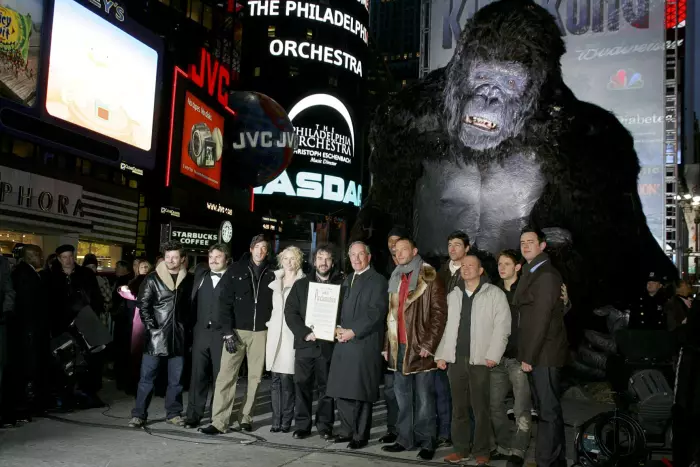Neil Sedaka may have sung that breaking up is hard to do, but Peter Jackson is showing what can blossom if you can.
New Zealand’s much-feted filmmaker transformed Wellington’s Miramar peninsula into a hub of movie magic in the 1990s after a string of highly entertaining schlock horrors were followed by 1994’s Heavenly Creatures.
Jackson’s shift in cinematic tone secured a nod at the Academy Awards in the form of a nomination for best original screenplay and introducing not only Kate Winslet to the world, but also the wonders of what the newly-formed Weta Digital could do in painting surreal landscapes with their keyboards.
The Frighteners in 1996 took CGI to another level after Auckland-based American Rob Tapert’s Hercules: The Legendary Journeys and its spinoff Xena: Warrior Princess brought a legion of Kiwi actors to a worldwide audience and made animated monsters a weekly thing.
What Weta Digital did in The Lord of the Rings trilogy was so far beyond what anyone else could do, and as a youngling in the early 2000s, you couldn’t help but feel a little sorry at how ropey the animation was in Harry Potter and the Philosopher’s Stone.
Of course, these were just a means for Jackson to bring his vision to life and Weta Digital was itself a spin-off from Weta Workshop, the company formed by long-time collaborator Richard Taylor and Tania Rodger producing physical effects – think the crazy array of puppets in Meet the Feebles.
This is where we start to see Jackson’s genius beyond filmmaking, but also in the business of film – in fact, business in general.
A fellowship
The Miramar movie mafia spans a web of related companies including Weta Workshop, Weta Digital, Park Road Post, Stone Street Studios, and Portsmouth Hire. That’s not to mention Jackson’s production company, WingNut Films.
It’s easy to think Jackson still sits atop this empire overseeing his domain, but the reality is that it’s been whittled down in recent years.
Taylor and Rodger are in charge of Weta Workshop and dabbling in virtual and augmented reality technology having partnered with Magic Leap a few years back.
Philippa Boyens – another long-time collaborator – has quietly shuffled off the share registers and directorships of various related companies.
Also tech titan Sean Parker – known for his hand in building the now-defunct Napster and serving as the first president of Facebook – came on as a cornerstone shareholder of Weta Digital in 2019 to help give it the cash needed to deliver on the Avatar sequels and attract talent as the company built a physical presence in the US.
His money, nous, and contacts book were seen as a useful addition to Weta Digital’s push into forming an animation studio able to meet the fast-paced demands of proliferating streaming services – and hopefully, cash in.
The need for those clever creative types also meant that it was time for a rethink about what Weta Digital is. Under new chief executive Prem Akkaraju, that’s no longer owning the infrastructure platform those visual effects artists use, rather it’s making sure their unreal imaginations can deliver whatever dreams and nightmares filmmakers want.
So we saw Weta Digital sell its tech unit, waving goodbye to 275 engineers – almost a fifth of its staff – and signing up as a customer to the platform under a new moniker, WetaFX. All for the princely sum of US$1 billion in cash and another US$625 million of stock in new owner, Unity Software.
It’s easy to see this as the start of an exit and it wouldn’t be surprising for WetaFX to list on the Nasdaq at some stage given Parker’s involvement.
Return to the king
While it wouldn’t be unexpected for some of those funds to end up with the shareholders, Akkaraju says employees will get some benefit and money will also go into the business.
It’s a remarkable shift for a series of businesses that have moved their focus from the physical to the virtual, and now to the conceptual, and firmly puts Jackson at the forefront of commercial reinvention as well as making movies.
Just look how difficult it is for some of New Zealand’s listed players to carve out parts that no longer fit, or would simply perform better if they shed a bureaucratic fiefdom.
Telecom had to be threatened with a heavily subsidised rival fibre company to split out its network business Chorus in a highly successful demerger – barring the regulatory rough and tumble – while Fletcher Building saw off pressure to carve itself up after a series of terrible acquisitions overshadowed the odd bright spark, and Fonterra needed to go through two years of red ink before breaking up its global empire.
Acquisitions always seem far more common and a way for management and directors to put capital to work rather than return it to its owners.
Whereas asset sales appear to follow a strategic review by an expensive investment bank that’s deemed something to be non-core – also known as falling into the ‘too hard’ basket, being a dud, or wanting too much cash.
Why they don’t like demergers remains a mystery to me.
It might be in bad taste, but it strikes me as being braindead that we don’t see more leaders of our big end of town nurturing these little hobbits before sending them out with their lovely bones once they can scale buildings like King Kong.














